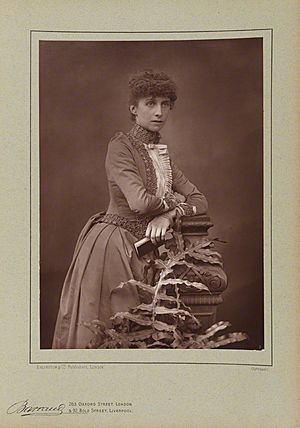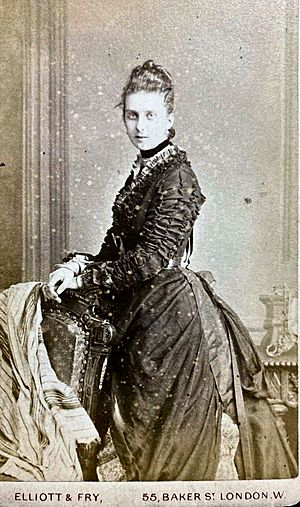Rosalind Ellicott facts for kids
Rosalind Frances Ellicott (born November 14, 1857 – died April 5, 1924) was an English composer. Many people thought she was one of the best female composers of her time.
Her Life Story
Rosalind Ellicott was born in Cambridge. Her parents were Constantia Annie Ellicott and Charles Ellicott. Her father was a Bishop in Gloucester and Bristol. He wasn't very interested in music.
But Rosalind's mother loved music! She was a singer and helped start music groups in London and Gloucester. She was the one who really encouraged Rosalind's musical talent.
Early Talent
When Rosalind was only six years old, she showed amazing musical skills. She could sing and even create harmonies by ear. At 12, she started taking lessons from Samuel Sebastian Wesley, a famous organist. By 13, she was trying to write songs, and at 16, she wrote a sonata.
Studying Music
From 1874 to 1876, Rosalind studied piano at the Royal Academy of Music. While there, she discovered she had a beautiful singing voice. She often sang solo parts in big musical pieces called oratorios and cantatas. She was also a frequent singer at the Three Choirs Festival.
Later, from 1885, she studied how to compose music for seven years. She became a member of several music societies. Even though she was quite successful as a composer and performer in the late 1800s, she started to disappear from public view in the early 1900s. After World War I, she moved to the south coast of England.
Rosalind Ellicott passed away in Seasalter in 1924. She is buried near her parents in Birchington-on-Sea, Kent.
Her Music
In 1886, Rosalind Ellicott became well-known at the Gloucester Festival. This was thanks to her orchestral piece called Dramatic Overture. Then, in 1889, her lyrical cantata Elysium was a big hit. People said Elysium had strong and exciting music. They also said it was a "charming and spirited work."
Both of these early works were performed in many cities. These included Bristol, London, and even Chicago. Some people thought her father's position as a bishop helped her music get played at the Three Choirs Festival. However, many new composers needed help from famous musicians or important people to get their music performed at festivals.
Musical Style
Rosalind's large works for choirs and orchestras were in a traditional, Romantic style. This means they were full of emotion and grand melodies. But as the 1800s ended, she started writing more chamber music. Chamber music is for smaller groups of instruments. She might have hoped these pieces would be performed more often.
Her first Piano Trio was played in Bristol in 1889. Rosalind herself played the piano. Her second trio was performed in Gloucester in 1903. Other pieces, like her Piano Quartet and Violin Sonata, were first played in London in 1900. Her songs and chamber works were often performed at festivals and were usually very popular.
Rosalind composed very quickly. She once said, "I get a whole movement in my head before I touch paper. I hardly ever alter my compositions." This shows how clear her musical ideas were.
Sadly, not much of Rosalind Ellicott's music has survived to today. Only a few songs and instrumental pieces remain.
Her Compositions
Orchestral Music
- Dramatic Overture (1886)
- Festival Overture (1893)
- Fantasia for piano and orchestra (1895)
- Overture To Spring
Chamber Music
- A Sketch for violin with piano accompaniment (1883)
- String Quartet in Bb (1884)
- A Reverie for Violoncello & Pianoforte (1888)
- Piano Trio No 1 in G (1889)
- Piano Trio No 2 in D minor (1891)
- Six Pieces for Violin and Pianoforte (1891)
- Piano Quartet in B minor (1900)
- Sonata in D for violin and piano (1900)
- Sonata for cello and piano
Choral Music
- Elysium cantata (1889)
- The birth of song: a cantata for solo singers, chorus, and orchestra (1892)
- King Henry of Navarre: a choral song for men's voices (1894)
Part Songs
- "Sing to me". A duet for Soprano & Tenor (1887)
- "Radiant Sister of the Day". A song for four voices (1887)
- "Peace be around thee". A song for four voices (1888)
- "Bring the bright Garlands". A part-song (1889)
Solo Songs
- "The sweet blue eyes of springtime". (1881)
- "From my sad tears are springing". (1881)
- "To the Immortals". (1883)
- "Verlust": a solo song (1884)
- "I love thee". (1887)
- "A Dream of the Sea". (1889)
 | Isaac Myers |
 | D. Hamilton Jackson |
 | A. Philip Randolph |



